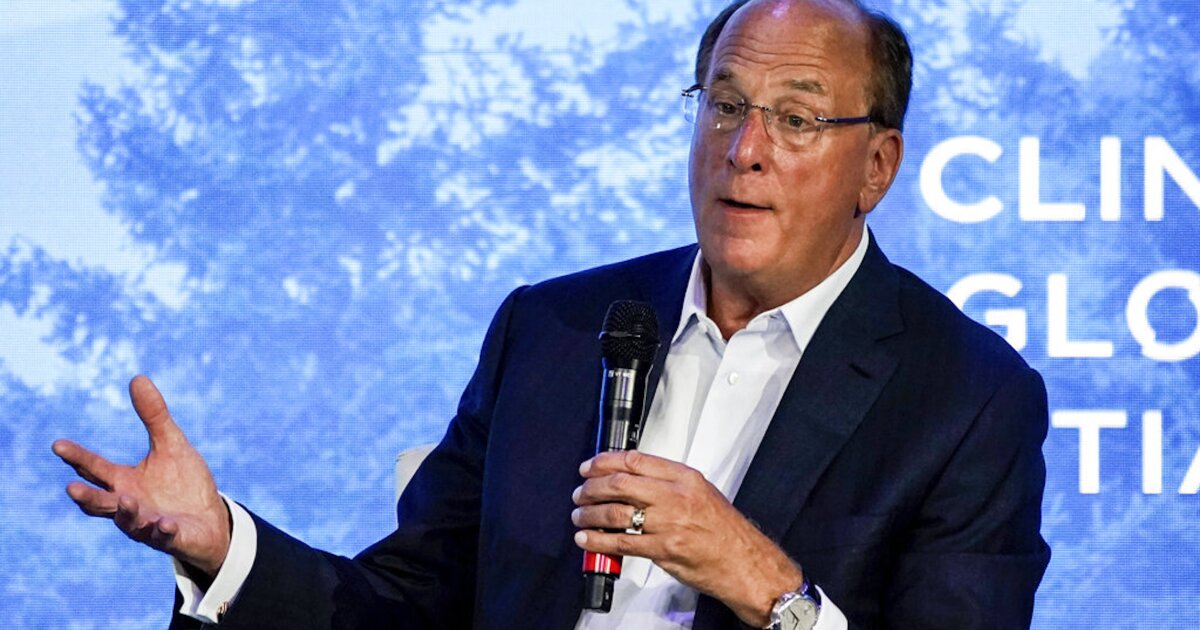

BlackRock CEO Larry Fink‘s much-anticipated annual letter deemphasized talk about the climate and said that companies aren’t “the environmental police,” a notable shift from the tone in recent years that has made him a top target of conservatives.
Fink has taken to writing an open investment letter each year that is considered a must-read for executives and business leaders. In 2020, he used his letter to focus on climate change, saying the issue was becoming a “defining factor” in BlackRock’s assessment of companies.
BILLIONAIRE MONEY MANAGER LARRY FINK BECOMING TOP CONSERVATIVE ADVERSARY
But this year, Fink shied away from leading with a discussion about climate change or ESG, instead emphasizing choice.
“Clients have always been central to all we do. Today we serve clients who have a wide range of investment objectives, preferences, time horizons, and risk tolerances,” Fink wrote. “We offer them choices to help them reach their investment goals. And we manage their assets consistent with their objectives and guidelines.”
Fink also spoke about BlackRock’s “Voting Choice” initiative that enables all U.S. public and private pension plans, in addition to endowments, insurance companies, and sovereign wealth funds, to engage in the proxy voting process.
“There are many people with opinions about how we should manage our clients’ money. But the money doesn’t belong to these people. It’s not ours either. It belongs to our clients, and our responsibility and our duty is to them,” Fink added. “Choice has never been more important to BlackRock than it is today because we have never served a broader and more diverse set of clients.
Fink pointed out that more than half of the companies in the S&P 500 are now voluntarily reporting disclosures about climate emissions — the federal government is working toward mandating doing so — although he emphasized the separation between the corporate world and government policy.
“I expect that number will continue to rise. But as I have said consistently over many years now, it is for governments to make policy and enact legislation, and not for companies, including asset managers, to be the environmental police,” Fink said.
Notably, the phrase “environmental, social, and governance,” or its more commonly used acronym “ESG,” is not explicitly mentioned once in the entire 9,000-word letter. Meanwhile, “choice” is mentioned more than two dozen times, and “clients” over 100 times.
Later in the letter, more than halfway through, Fink mentions “climate” for the first time. He discusses how BlackRock monitors climate risk and says that the transition away from fossil fuels is still part of long-term investment strategies.
“Investing for the long term requires taking a long-term view of what will impact returns, including demographics, government policy, technological advancements, and the transition to a low-carbon economy,” Fink said.
Last year, in his much shorter 3,300-word letter, he defended against Republican accusations that the massive firm had gone “woke.” Fink defended “stakeholder capitalism” from the idea that it is a political movement and urged companies to embrace its tenets.
The shift comes amid a broad push by Republicans to rebut ESG investing and specifically push back against BlackRock, which has, in some respects, become the GOP punching bag for the ESG movement.
Late last year, Florida’s chief financial officer said the state would divest some $2 billion from the money manager, the largest such state divestment from BlackRock yet over its stance on environmental and social goals.
States such as South Carolina, Utah, Arkansas, Missouri, Louisiana, and others have also divested or announced planned divestments of hundreds of millions of dollars from BlackRock and Fink.
“As major banking institutions and economists predict a recession in the coming year, and as the Fed increases interest rates to combat the inflation crisis, I need partners within the financial services industry who are as committed to the bottom line as we are — and I don’t trust BlackRock’s ability to deliver,” said Florida CFO Jimmy Patronis.
During an interview with Bloomberg during the World Economic Forum in Switzerland, Fink addressed the GOP attacks.
“I’m taking this very seriously,” Fink said. “We are trying to address the misconceptions. It’s hard because it’s not business anymore, they’re doing it in a personal way. And for the first time in my professional career, attacks are now personal. They’re trying to demonize the issues.”
Republican states, many with robust energy industries that contribute to employment, fear that the corporate world is trying to “boycott” fossil fuels and see ESG as a direct threat to their state’s economy.
CLICK HERE TO READ MORE FROM THE WASHINGTON EXAMINER
There have also been accusations that by prioritizing ESG, major firms like BlackRock are cutting against their main commitment, which is to return value to shareholders. Fink closed out his 2023 letter by emphasizing the delivery of returns.
“I use my voice to advocate for BlackRock’s clients, to encourage people to invest with a long-term perspective and to speak out about risks and opportunities that investors need to navigate,” he wrote. “Since BlackRock’s founding, we have always been unwavering in our commitment to serving our clients, and by doing so, we have delivered outsized returns for our shareholders.”





